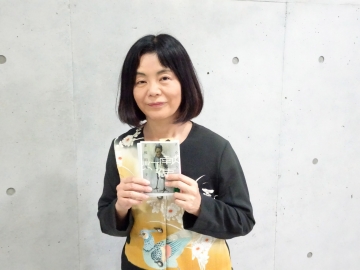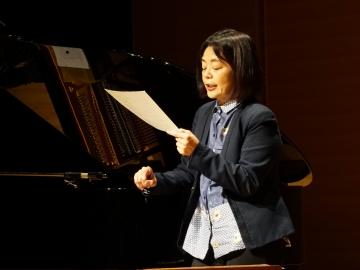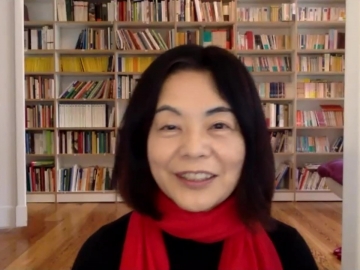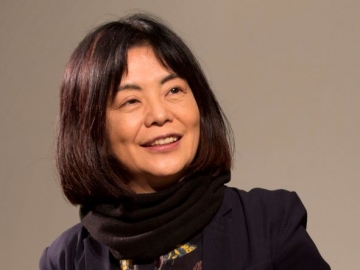On November 1, 2022, a workshop with writer and visiting professor Yoko Tawada was held by Waseda University’s Global Japanese Studies Model Unit. This was the fifth academic workshop with Yoko Tawada, held face-to-face for the first time in three years. With the overall theme “gender,” three graduate students presented their research on Tawada’s works.
First, Misato Isozaki, a first-year student in Graduate School of Letters, Arts and Sciences, Master Course, Cultural Sciences (Creative Writing and Criticism), Waseda University, gave a presentation titled “Unlinkable Words and Bodies in Nisô to kyuupiddo no yumi.” Although Nisô to kyuupiddo no yumi is set in a German convent, the nuns do not have katakana names. They are described using kanji nicknames given by the narrator, which creates a mysterious atmosphere. Moreover, the readings of these kanji characters are not obvious. The presenter pointed out that these names have the effect of foreshadowing the progress of the story, and noted that only the narrator (“I”) and the abbess, absent for a long time, do not have names. In the second part, the abbess becomes the narrator, reporting how an archery lesson given by a taciturn teacher shakes her linguistic world. The nun’s mind becomes unable to attach her body to the language system and “falls”. This “falling” action frequently appears in Tawada’s works, with multiple meanings. Finally, the short story Umi ni otoshita namae was interpreted as a story about “I,” a person without the proper name and resisting others’ attempts to give a name and social background, and the divergence between body and name and the interrelationship between them were discussed.
Tawada commented that she dared to give the characters nicknames in kanji, based on her sense of discomfort on katakana characters in a Japanese text. Such attempts can be seen in Hikon and Anaaki Efu no hatsukoi matsuri, and furthermore, the main character is named “Mumei (Nameless)” in The Emissary Further research on the function of names in Tawada’s works may be possible in the future.
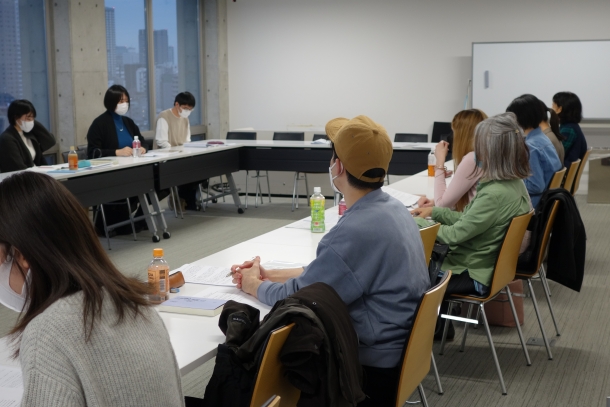
The second presenter, Akihito Saito, a first-year student in Graduate School of Humanities, Master’s Program in German Literature, Sophia University, gave a presentation titled “Sex and the Body in Tawada’s Works: Focusing on the ‘Shift’ of Gender Images.” The presenter drew attention to the fact that Mumei in The Emissary is portrayed as a boy at first glance, but acquires a feminine body in the course of the work, as his breasts expand and he experiences menstruation, and pointed out that “everyone definitely experiences gender transition once or twice in their lives” in the world of this work, isolated Japan in near future. The change of sex occurs not of one’s own volition but by “the machinations of nature,” and is not necessarily unidirectional, since it can happen twice. He noted that Tawada’s early works are also littered with images of gender “shift/disturbance,” and considered that Tawada’s stance of placing herself in the middle zone applies to her gender expression as well. It was stimulating to discover that crossing the border is not a one-time thing, but a constant “shift/disturbance” within the work.
The third presenter, Kanoko Segawa, a second-year student in Graduate School of Letters, Arts and Sciences, Master Course, Cultural Sciences (Creative Writing and Criticism), Waseda University, gave a presentation titled “The Four contraposition of God, Goddess, Flower, and Snake: Analysis of Orpheus oder Izanagi.” The subject was a radio drama broadcast in Germany in 1997, in which Greek and Japanese myths were mixed and retold. By analyzing the relationship between the characters of Ogi, a man (god) of a superimposition of Orpheus and Izanagi, and Inake, a woman (goddess) of a superimposition of Eurydice and Izanami, as well as flowers and snakes, the presenter pointed out the possibility of creating alternative elements, not binary, in the relationship between the sexes, and focused on the tragedy brought about by “men in action.” The analysis of the representation of snakes in mythology and in Tawada’s works was interesting, and the discovery of wordplay emerging in the translation into English, such as INAKE, snake, and naked, was also excellent. The consideration of the “quadrangle” as a way to avoid René Girard’s “triangle of desire” will lead to further research in the future. Tawada also commented that animals are necessary to break down the gender dichotomy.
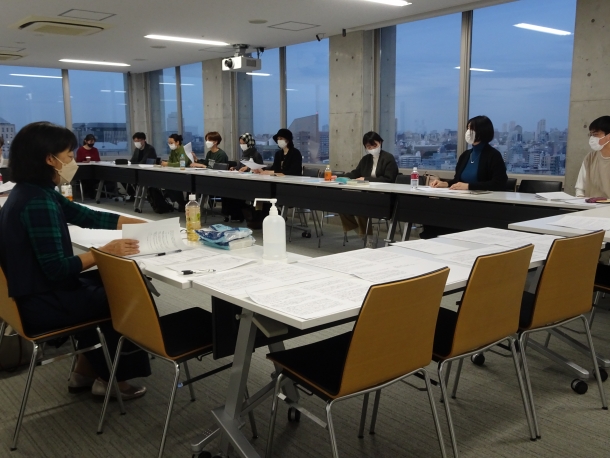
Finally, guest commentator Elena Giannoulis (Professor of Japanology at Free University of Berlin) gave a detailed report on gender diversity and name issues in the German-speaking world, giving us an insight into what kind of considerations and new innovations are being made in German, a language with the Grammatical “gender.” In this regard, Tawada also introduced her six lectures “Beyond Gender” at the University of Bamberg in July, which allowed us to touch on the problems of thinking and creating while taking minorities into consideration in the complex linguistic rules of today. The workshop was attended by undergraduate students, international students, graduate students (including those from other universities), and foreign researchers as audience members, and a lively question and answer session was held, exceeding the scheduled time. (Report written by Miho Matsunaga)
Comments from students:
“It was a valuable opportunity for me because I don’t usually have a chance to make a presentation on this topic.”
“It was stimulating to hear excellent presentations and discussions.”
“I got some hints for my future research.”
Event Overview
- Date and time: November 1, 2022, 16:30 – 18:40
- Venue: Conference room 10, Bldg. 33, Toyama campus, Waseda University
- Commentator: Yoko Tawada
- Moderator: Arisa Iwakawa (Associate Professor, Waseda University)
- Guest speaker: Elena Giannoulis (Professor, Freie Universität Berlin)
